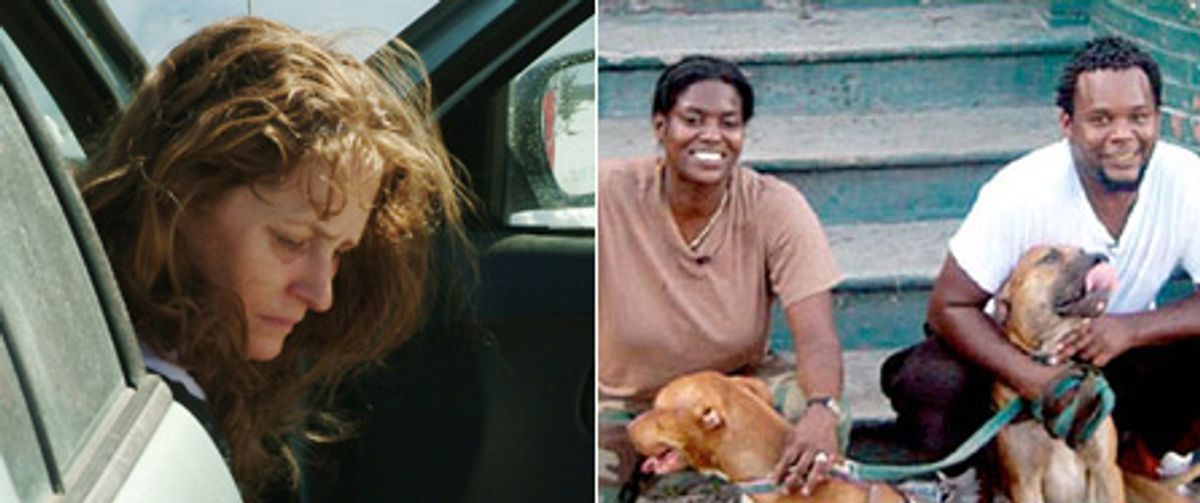
Scenes from "Frozen River" and "Trouble the Water"
Film-festival awards, with the partial and occasional exception of the Palme d'Or at Cannes, have all the aesthetic significance and marketplace impact of yesterday's bus transfer. Very often the most intriguing premieres and highest-profile titles aren't in competition (again, Cannes is an exception), and very often both jury and audience awards tend to land on a film that excels in no particular area, but doesn't offend anybody or piss anybody off.
Sundance has occasionally bestowed its honors on unquestionably worthy films that went on to modest, indie-scale success; in 2003, the dramatic grand-jury prize went to "American Splendor," the audience award to "The Station Agent" and the documentary prize to "Capturing the Friedmans." Quite frankly, a year like that is so rare in Sundance history that it feels like the operation of random chance. Here are the major jury-prize winners of the last four years, listing narrative features first and documentaries second: "Primer" and "DiG!" (2004), "Forty Shades of Blue" and "Why We Fight" (2005), "Quinceañera" and "God Grew Tired of Us" (2006), "Padre Nuestro" and "Manda Bala" (2007).
I think a couple of those are outstanding films -- which is, and should be, the principal criterion. Others are mysterious, pin-the-tail-on-the-donkey selections: "Quinceañera"? As the best film in a list that included "Half Nelson," "Flannel Pajamas," "A Guide to Recognizing Your Saints," "In Between Days," "Sherrybaby," "Steel City," "Stephanie Daley" and "Wristcutters: A Love Story"? Give me a break! As for last year, Jason Kohn's high-style, Brazil-as-hell documentary "Manda Bala" sank without a trace, while Christopher Zalla's immigrant drama "Padre Nuestro" hasn't even been released (although it will be, eventually, by IFC).
That's quite a set-up for the 2008 Sundance prizes, ain't it? Well, here's the good news: Although I haven't seen all of this year's prize-winners, I don't think there's a turkey in the group. It was undeniably a bear market for name-brand movies in Park City this winter, but the range of appealing, low-budget, sub-Indiewood pictures was impressive. None of these films will make $100 million; many will be fortunate to make $1 million, given the dire marketplace conditions of the moment. Maybe there wasn't anything in competition this year that suggested the second coming of Orson Welles, but I believe we caught the early stages of several intriguing and high-integrity careers. This was a bad Sundance -- if you work for a major media conglomerate. If you like movies, it was a pretty good one.
The Grand Jury Prize for narrative film went to writer-director Courtney Hunt's "Frozen River," an appealing and atmospheric tale of poverty and illegal immigration, featuring a fine lead performance by Melissa Leo and shot in and around a Mohawk reservation that straddles the New York-Ontario border. "Frozen River" was almost universally admired, although most critics would have chosen "Ballast," Lance Hammer's mesmerizing work of Mississippi minimalism; Marianna Palka's acerbic romantic comedy "Good Dick"; or Anna Boden and Ryan Fleck's Dominican-baseball drama "Sugar." (That last would have been my choice, I think.) The audience award went to Jonathan Levine's "The Wackness," a 1994-set New York coming-of-age tale that I didn't catch.
On the documentary front, the grand jury prize was awarded to Tia Lessin and Carl Deal's "Trouble the Water," an extraordinary post-Katrina tale of heroism and survival. There was some mumbling among documentary purists about this title (was its subject, Kim Roberts, hoping to use the exposure to launch her rap career? Maybe so; who cares?), but its effect on viewers was electric. Surprisingly, "Trouble the Water" did not double up with the audience award, won by Josh Tickell's biofuel-activism saga "Fields of Fuel." (I didn't see the movie, but the buttons, ski hats and other gear were ubiquitous in Park City.) Other competition docs you'll be hearing more about include Nanette Burstein's "American Teen" (which won a directing award), Christopher Bell's steroids study "Bigger, Stronger, Faster," Irena Salina's enviro-doc "Flow: For Love of Water," Alex Gibney's Hunter S. Thompson biopic "Gonzo," Margaret Brown's "The Order of Myths" and Marina Zenovich's "Roman Polanski: Wanted and Desired."
The world cinema jury prize for dramatic films went to Swedish director Jens Jonsson's family drama "King of Ping Pong," and the audience prize to Amin Matalqa's "Captain Abu Raed," a reputed heartwarmer that's apparently the first feature made in Jordan in 50 years. (Filmmaking in the Arab world is dominated by Egypt and Tunisia.) Both the jury prize and the audience prize in world documentary were won by British filmmaker James Marsh's "Man on Wire," one of the Sundance films I'm truly sorry I missed. It's an exploration and reconstruction of Philippe Petit's "artistic crime of the century," an illegal high-wire walk staged in August 1974 between the World Trade Center's towers, 1,350 feet above the street.
In other awards, Hammer won a special directing prize for "Ballast," and Lol Crawley won one for the film's cinematography (it was shot in wide-screen 35mm, using only natural light). The annual Waldo Salt Screenwriting Award went to director Alex Rivera and his co-writer David Riker, who authored the paranoid, "Matrix"-esque sci-fi thriller "Sleep Dealer." A special jury prize was awarded to Sam Rockwell, Anjelica Huston, Kelly Macdonald and Brad William Henke, the hilarious ensemble cast of Clark Gregg's Chuck Palahniuk adaptation "Choke," which is forthcoming from Fox Searchlight.



Shares